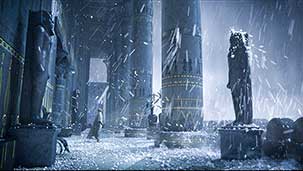At the very least, they got you right. In a film that is tonally flat and visually bloated, you’re pitch perfect: jealous, capricious, and inscrutable. Old Testament God as genocidal child.
Ridley Scott has always been one of those directors, the kind whose films you see simply because they’re involved. Or perhaps he used to be one of those directors. Because Exodus: Gods and Kings is a mess. It’s a film marred by uneven pacing, a wasted cast (Sigourney Weaver has three, maybe four lines), and long stretches of monotonous exposition. Christian Bale and Joel Edgerton, the leads, feel like expedient choices, as if Scott had to sell the idea to the studios rather than pick the actors who would work best (in fact, he’s admitted as much).
I wonder, perhaps, if biblical epics are simply prone to this kind of weird mixture of hubris and lazy storytelling. It has permeated the genre almost from the very beginning. The cultural ubiquity of the core stories, even when married with spectacle, can’t quite cover up the gossamer thin characterization and laughably sloppy plot contrivances.
Kind of like the source material when you really think about it.
You are the single redeeming feature for me, Yahweh. Your brief, enigmatic interactions with Moses are sharp and interesting. They give Exodus: Gods and Kings a narrative focus that is otherwise lacking throughout the film. There is a chemistry between you and your initially reluctant prophet. For a few moments we see something resembling real human emotion on screen, even if it comes from a pissed off pre-teen deity.
That’s not the case in the rest of the two-plus hours of this particular Ridley Scott production. He has had a pretty good track record picking his leads, but his last three or four films – Robin Hood, Prometheus and The Counselor – have all seemed slightly miscast despite the star power each of them boast. Here it’s no different.
Scott, like much of the Old Testament work you inspired, depends a great deal on conjuring a sound and fury that ultimately signifies nothing. Why bother making this film? It’s just a limp, episodic re-telling of a familiar story bereft of any motivating force—there is simply no THERE there.
It’s the bible without belief, a myth that doesn’t revel in it’s own fantasy. Unlike Aronofsky’s Noah, which clearly saw God as metaphor rather than immanent – more Spinoza than Augustine, if you will – this film doesn’t really take a stance one way or another. Your depiction as an impatient, powerful adolescent sits in a weird vacuum since the rest of the movie doesn’t reflect that sensibility at all. Which is too bad, since that might have been a film worth seeing.
Instead Scott seems to have borrowed from your playbook: neglecting narrative discipline for a kind of meandering hodgepodge of contradictory and incoherent exposition, then trying to pull it all together with a big ending. An ending, which while beautiful and awe inspiring, is ultimately empty. None of it means a thing if you lose us in the first act. And I just didn’t buy it from the genesis.
Sincerely,

Tim








